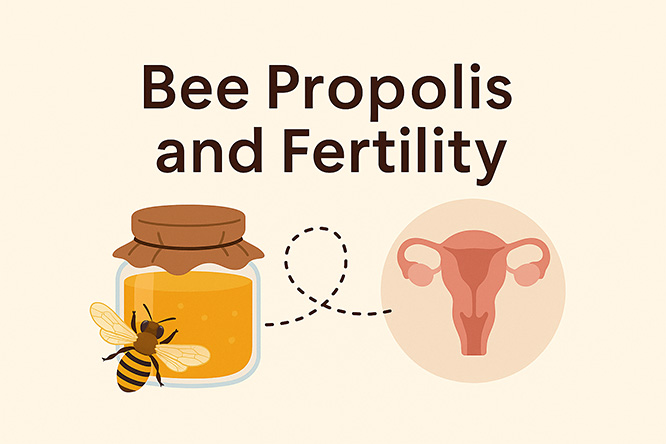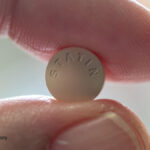Bee propolis might actually help with fertility—both for men and women. Studies show it can improve sperm quality, calm inflammation, and support hormone balance, especially if you’re dealing with PCOS or endometriosis. Let’s break down what the research says and how it could play a role in your fertility journey.
Disclaimer: This post contains affiliate links which means I may get a small commission if you purchase a product after clicking on a link. This does not cost you anything. As an Amazon Associate I earn from qualifying purchases.
How does bee propolis actually help with fertility?
Bee propolis is packed with antioxidants and other helpful compounds that support your body in different ways. When it comes to fertility, its main superpower is reducing inflammation and protecting your reproductive cells from oxidative stress—that’s the kind of damage that can mess with sperm health or hormone balance.
It also helps regulate hormones, which is especially useful if your fertility struggles are linked to things like PCOS or poor sperm quality.
Some studies even suggest propolis might help improve the health of the ovaries and boost sperm motility (both important for increasing your chances of conceiving).
In simple terms? Propolis helps your body create a healthier environment for conception.
Bee propolis for male fertility: What the research says
If you’re trying to conceive and male fertility is part of the picture, bee propolis might help.
One of the biggest issues with male infertility is poor sperm motility (how well the sperm swim). This is often linked to oxidative stress, which happens when there’s an imbalance between harmful free radicals and the body’s ability to neutralise them. Over time, this can damage sperm and lower fertility.
In a randomised controlled trial on men with asthenozoospermia (a condition where sperm have low movement), men who took 1500 mg of bee propolis daily for 10 weeks saw real improvements. Their sperm count and motility increased, and levels of inflammation and oxidative stress went down.
Animal studies support these findings too. In one, rats exposed to copper (which damages reproductive health) were given propolis. It improved sperm quality, boosted antioxidant levels, and helped restore healthy testicular tissue.
A 2023 review of studies on propolis and male fertility found the same trend: propolis can protect the testes, support testosterone levels, and improve semen quality in various cases of reproductive stress.
In short, if sperm health is a concern, propolis may offer some natural support—especially where oxidative damage is playing a role.
What about female fertility?
Propolis may also be helpful for women, especially if fertility issues are linked to hormone imbalances or inflammation.
In one small study, women with mild endometriosis took 500 mg of bee propolis twice a day. After nine months, 60% of them became pregnant—compared to just 20% in the placebo group. No side effects were reported.
There’s also encouraging research around polycystic ovary syndrome (PCOS), a common condition that can interfere with ovulation. In a clinical trial on women with PCOS, daily supplementation with 500 mg of propolis for 12 weeks led to lower testosterone levels and improved insulin sensitivity—two factors that play a big role in fertility.
Additional findings from a 2023 review highlight how propolis helped reduce cystic follicles and improved ovarian structure in animal models of PCOS.

Bee propolis dosage for fertility: How much to take?
Most studies suggest taking between 500 mg and 1500 mg of bee propolis per day to support fertility. This range has been shown to be safe and effective in both men and women.
In men, 1500 mg daily was used for 10 weeks and helped improve sperm quality. In women with PCOS or endometriosis, 500 mg per day—either as a single dose or split into two—was linked to better hormone balance and higher pregnancy rates.
These doses come from human studies and are generally well tolerated. Animal studies often use much higher amounts, but those don’t directly apply to humans.
To stay safe, start with a lower dose (around 500 mg), and if you’re considering a higher amount, speak to a healthcare professional first. Always choose a high-quality supplement with clear ingredient labelling.
While more research in humans would be ideal, the early signs suggest propolis could support fertility in women dealing with hormone-related conditions like PCOS or endometriosis.
When should you take it for best results?
Take bee propolis daily for at least 8 to 12 weeks to support fertility. That’s the timeframe used in most studies showing positive results.
There’s no strict rule on timing—some people take it once a day, others split the dose between morning and evening. What matters most is being consistent.
If you’re planning to conceive, it’s best to start a couple of months in advance or alongside fertility treatments (with your doctor’s okay). Propolis works gradually, so give it time to support your body.
Bee propolis or royal jelly—which is better for fertility?
They’re both helpful, just in different ways.
Propolis is great if you’re dealing with inflammation, hormone imbalances, or conditions like PCOS or endometriosis. It’s been shown to support sperm health too, so it works for both men and women.
Royal jelly is more about boosting egg quality and overall reproductive function. It’s packed with nutrients and natural hormones, which is why it’s often used by women trying to improve ovarian health.
You don’t have to pick one over the other. Some people use both—propolis for protection and hormone balance, royal jelly for extra reproductive support. It really depends on what your body needs.
Is bee propolis good for conception and infertility?
Yes, it can help—especially when fertility issues are linked to hormone imbalance or poor sperm quality.
Studies have shown improved pregnancy rates in women and better sperm health in men after taking propolis. It’s not a cure-all, but it may improve your chances if you’re dealing with certain underlying issues.
The bottom line
Bee propolis shows real potential as a natural way to support fertility. Research points to benefits for both men and women, with no major side effects reported. If you’re considering it, go for a good-quality supplement and speak to your doctor to make sure it’s right for you.







